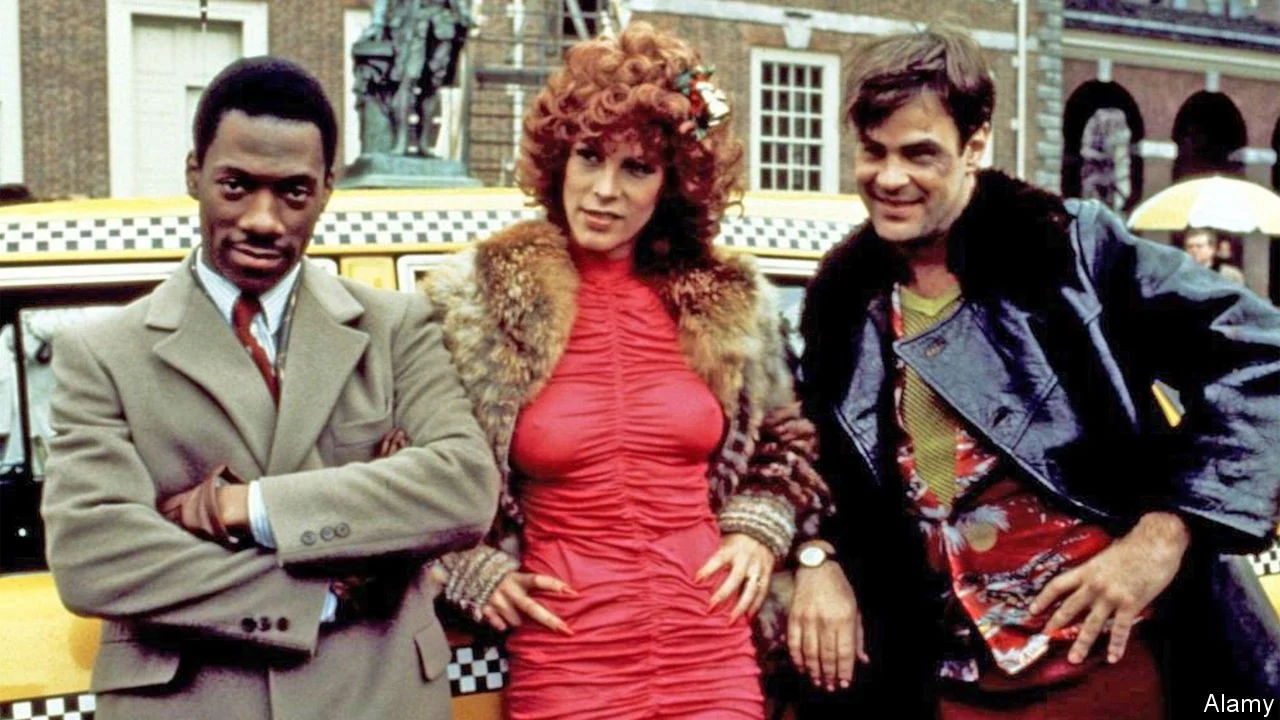IT IS NEW Year’s Eve, and bawdy revellers are enjoying a fancy-dress party on an American train; in the baggage compartment is a caged gorilla in the care of two doofus handlers. “Trading Places”, John Landis’s rags-to-riches (and vice versa) comedy of 1983, is often considered a Christmas movie, but it is really a story about, and for, the turn of the year. The film is a Janus-faced contradiction, reaching backwards to old prejudices yet in other ways modern. It is a salutary new year’s object lesson in the reassessment of troubling art.
The sequence on the train is pivotal in more than one way. This is when the heroes—played by Eddie Murphy, Dan Aykroyd, Jamie Lee Curtis and Denholm Elliott—pull off a heist that will launch their new lives while ruining the baddies, the Duke brothers (Don Ameche and Ralph Bellamy), a pair of nasty elderly plutocrats. The train ride is also when the issues of taste, and race, which scar the film are most glaring. As the heroes don disguises to gull the Dukes’ henchman, Mr Aykroyd’s character needlessly blacks up; he then engages in some nauseating badinage with Mr Murphy, himself doing a grisly impersonation of an exchange student from Cameroon.
That is the nadir, but there are lots of cringe-inducing moments: racial stereotyping, explicit and vicious racism that is presented as reprehensible but played for laughs, casual homophobia, a caricature Irishman and gratuitous nudity. The plot itself revolves around a bet between the Dukes, who run a commodities brokerage, over whether they can successfully install Mr Murphy’s black street hustler in place of Mr Aykroyd’s pompous white executive, at the same time impoverishing the suit such that he resorts to crime. They can and do—a reversal meant to show the predominance of nurture over nature, which winds up implying that poverty makes people morally deficient. The lesson is summed up in an exchange between the Dukes. “Money isn’t everything,” one says. “Oh, grow up,” his brother replies.
“Trading Places” is lovingly remembered by lots of viewers now in middle age (perhaps the white, male sort in particular). Any who watched it again over the holidays may have been jarred, even shamed, by attitudes and language that they once blithely tolerated. The film is still very funny, but not funny enough. It is hard today to recommend it in good conscience. And yet revisiting it is also a reminder that flawed artworks, like flawed people, can have extenuating features, nuance can coexist with crassness and forward-thinking jostle with the retrograde kind. The past may indeed be a foreign country, but they did lots of different things there.
The improbable climax—when the goodies take revenge by short-selling frozen orange-juice futures, after intercepting insider information—led to a section of the Dodd-Frank Act of 2010, which deals with the use of misappropriated government data, being known as “the Eddie Murphy rule”. But it is not just the take on financial shenanigans that resonates almost four decades on. Before the ending’s fairy-tale schmaltz about fresh starts and never giving up, Mr Aykroyd’s character has a turn in cinema’s grubbiest ever Santa suit—in which he secretes a smoked salmon, is drenched by rain and used as a lamppost by a mutt, before trying and failing to shoot himself. It is an enduring cameo of existential despair.
Offensive as the perspective on race often is, meanwhile, it is intermittently bold, too. The story is mostly set in Philadelphia, and a key scene occurs outside Independence Hall, where the Declaration of Independence and the constitution were signed. This is not merely a zany caper with a subtext of injustice, the symbolism insists; the inequalities it depicts, between races and classes, are also the story of America. The opening, documentary-style footage of the city’s streets underlines this ambition.
Most important are the two moments when, startlingly, Mr Murphy breaks the fourth wall, looking directly at the camera and through it at the audience. The first comes after half a dozen police guns are pointed at his character’s head, he is wrongly arrested and carted away in a squad car. The second comes when, explaining the commodities markets, the Dukes insultingly tell him that bacon is the thing found in a blt sandwich.
In these frames Mr Murphy’s expression is defiant, infinitely unsurprised, accusatory, coldly furious: a wordless, powerful indictment of racism—including the viewer’s. These fleeting, jolting seconds seem to belong to another movie entirely. Looking into the camera, Mr Murphy turns “Trading Places” into a film that, like New Year’s Eve, looks both ways.
By The Economist





